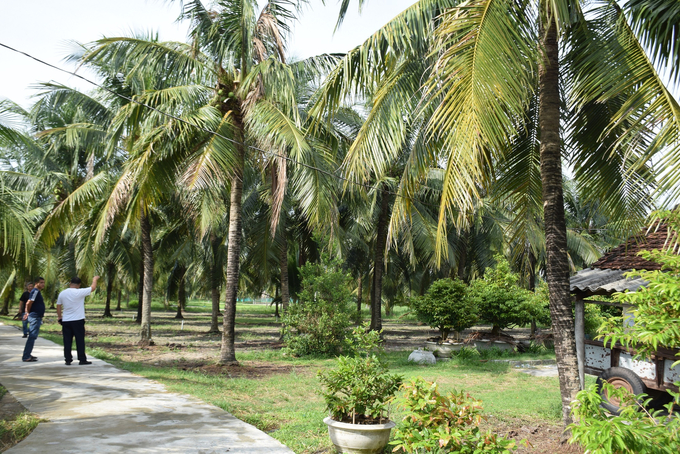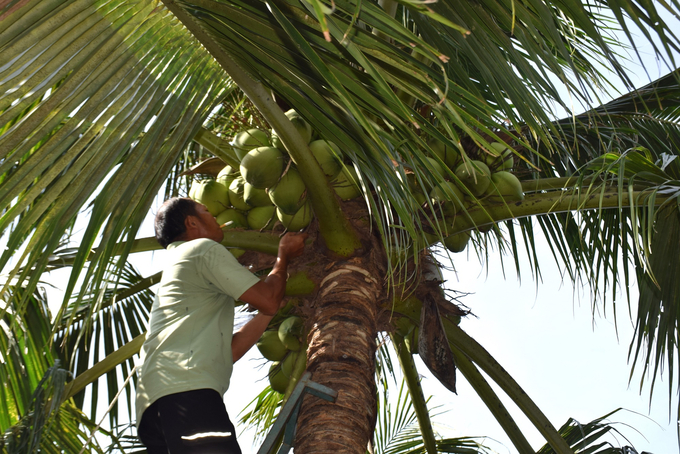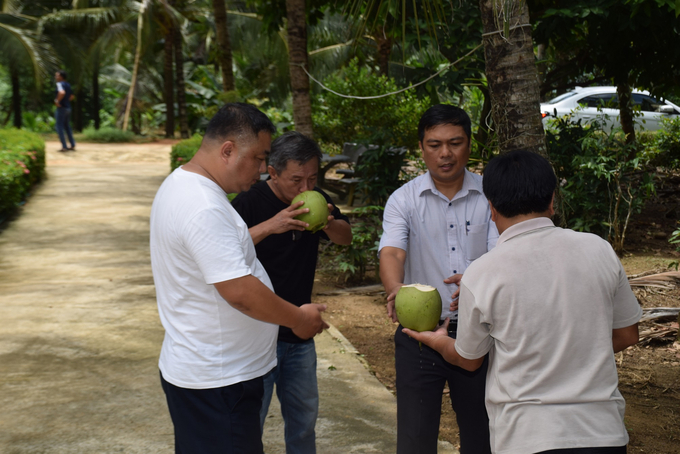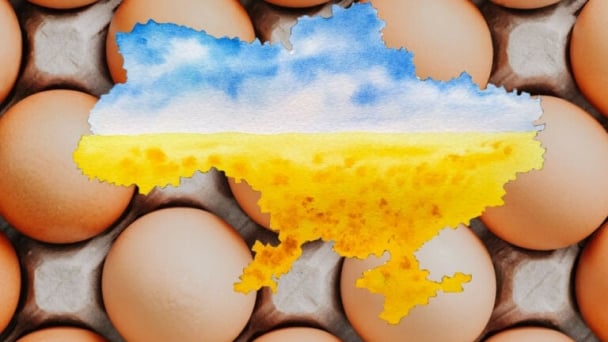May 20, 2025 | 20:24 GMT +7
May 20, 2025 | 20:24 GMT +7
Hotline: 0913.378.918
May 20, 2025 | 20:24 GMT +7
Hotline: 0913.378.918
According to Mr. Kieu Van Cang, Head of the Plant Cultivation and Protection Sub-department of Binh Dinh, China has recently granted Binh Dinh five planting area codes specifically for drinking coconuts. Of these, Phu Cat District received four codes, which correspond to three coconut-growing areas located in the villages of Hoi Van, Hoa Dai and Tung Chanh within Cat Hiep Commune, as well as Phu Kim Village in Cat Trinh Commune. Additionally, Hoai An District received one code for its drinking coconuts in An Thanh Commune.
In recent days, farmers cultivating Siamese coconuts in Phu Cat have been filled with excitement, as their fresh coconuts now possess the official "pass" allowing them for legal export to the Chinese market. This development not only opens up significant opportunities for farmers but also promises to stabilize the selling prices and establish a reliable market for fresh coconuts.

A business owner specializing in the purchase and export of fruits from Ben Tre visited the coconut garden of Mr. Le Dinh Man (46 years old) in Hoi Van Village, Cat Hiep Commune (Phu Cat District, Binh Dinh). Photo: V.D.T.
According to Mr. Luong Van Khoa, Deputy Head of the Agriculture and Rural Development Department of Phu Cat District, there are currently nearly 1.200ha of Siamese coconuts in the district. Of this area, approximately 1.160ha are actively bearing fruit, producing an impressive total of about 17.340 coconuts each year. The Siamese coconuts in Phu Cat yield an average of 85 coconuts/tree annually, with each coconut weighing around 2kg.
Mr. Kieu Van Cang, Head of the Plant Cultivation and Protection Sub-department of Binh Dinh, noted that the province as a whole has approximately 2.300ha of drinking coconuts. The average yield in Binh Dinh stands at 119.3 quintals/ha, resulting in an impressive annual production of 111.358 tons. Traditionally, the Siamese coconuts from Binh Dinh have mainly been consumed within the province and in neighboring markets. However, with the recent signing of a protocol for exporting coconuts to China, there is a promising outlook for expanding the market for drinking coconuts.

Mr. Le Dinh Man is picking coconuts for customers to taste. Photo: V.D.T.
Mr. Le Dinh Man, 46 years old, who owns nearly 300 Siamese coconut trees on a garden area of 14 sao (approximately 500 square meters/sao) in Hoi Van Village, Cat Hiep Commune (Phu Cat District), couldn't hide his excitement when the owner of a fruit export business from Ben Tre visited his garden. The visitor came to taste the coconut water freshly picked from the trees to assess its quality.
Mr. Man shared, "Knowing his intentions, I immediately climbed up to pick a bunch of coconuts for him to taste. After trying it, he praised the flavor. He said the coconut water here has a sweetness level exceeding 9 degrees Brix, which is sweeter than the coconuts from Ben Tre. He decided to return to Phu Cat to set up a processing plant to purchase and export fresh coconuts to Chinese market."
In recent years, following the recommendations from local agricultural authorities, Mr. Man has been caring for his coconut garden using organic methods. He completely avoids chemical fertilizers and only applies a mix of livestock manure and Trichoderma products. For pest control, he uses biological pesticides instead of chemical ones, ensuring a more sustainable and eco-friendly approach to his farming practices.

The business owner from Ben Tre tastes coconuts in Hoai An (Binh Dinh) and evaluates that the coconuts from Binh Dinh have a sweetness level exceeding 9 degrees Brix. Photo: V.D.T.
According to Mr. Luong Van Khoa, Deputy Head of the Agriculture and Rural Development Department of Phu Cat District, the biggest concern for coconut farmers is the Dynastinae ant. When coconut trees start to bear fruit, Dynastinae ants appear and damage the coconut buds. If the ants consume the buds, it means the farmer will lose their harvest since the tree will not produce fruit. In contrast, the beetles mainly harm the leaves, reducing overall productivity.
"Farmers in Phu Cat manage weaver ants by hanging bags of salt on the coconut stumps. The salt dissolves and drips onto the buds, helping to prevent damage from the ants. For the beetles, the locals use biological pesticides to control their population", Mr. Khoa explained.
According to Mr. Kieu Van Cang, Head of the Plant Cultivation and Protection Sub-department of Binh Dinh, by 2025, the area of coconuts in Binh Dinh is expected to increase from 9.352ha to 9.520ha, with a yield of 124.7 quintals/ha and an estimated production of 116.400 tons.
"By 2030, the area is expected to expand to 10.000ha, with a yield of 122 quintals/ha and a production target of 117.730 tons. Of this, the area dedicated to Siamese coconuts will account for 35.5%, in order to meet the increasing demand for fresh drinking coconuts", Mr. Kieu Van Cang stated.
Translated by Phuong Linh

(VAN) Oliyar, a prominent Ukrainian oil and fat manufacturer, has revealed plans to build a farm for 2.3 million laying hens in the Lviv region. The additional production quantities promise to change the competitive landscape of the egg market of the Eastern Europe region.

(VAN) On May 15, Ministry of Agriculture and Environment of Vietnam hosted the 'Connecting Vietnam - Germany agricultural, forestry and fishery trade' seminar in Berlin, Germany.

(VAN) In the face of counterfeit and imitation products, Khanh Hoa Salanganes Nest Company hopes for the prompt completion of the legal framework, strict enforcement against violations, and protection of the bird’s nest brand.

(VAN) Japan's efforts to lower the price of rice through the release of its stockpile may finally be making some progress, albeit at a snail's pace.

(VAN) U.S. tariffs are not only a 'shock', but also an opportunity for Vietnamese businesses to renew their mindset toward comprehensive development.

(VAN) As Bac Giang lychee enters the harvest season, Minister Do Duc Duy expects that the fruit will contribute greatly to agricultural exports due to standardized production and deep processing.

(VAN) Consumers have shown a preference for free-range eggs, but those farming systems are more vulnerable to biosecurity risks like bird flu.